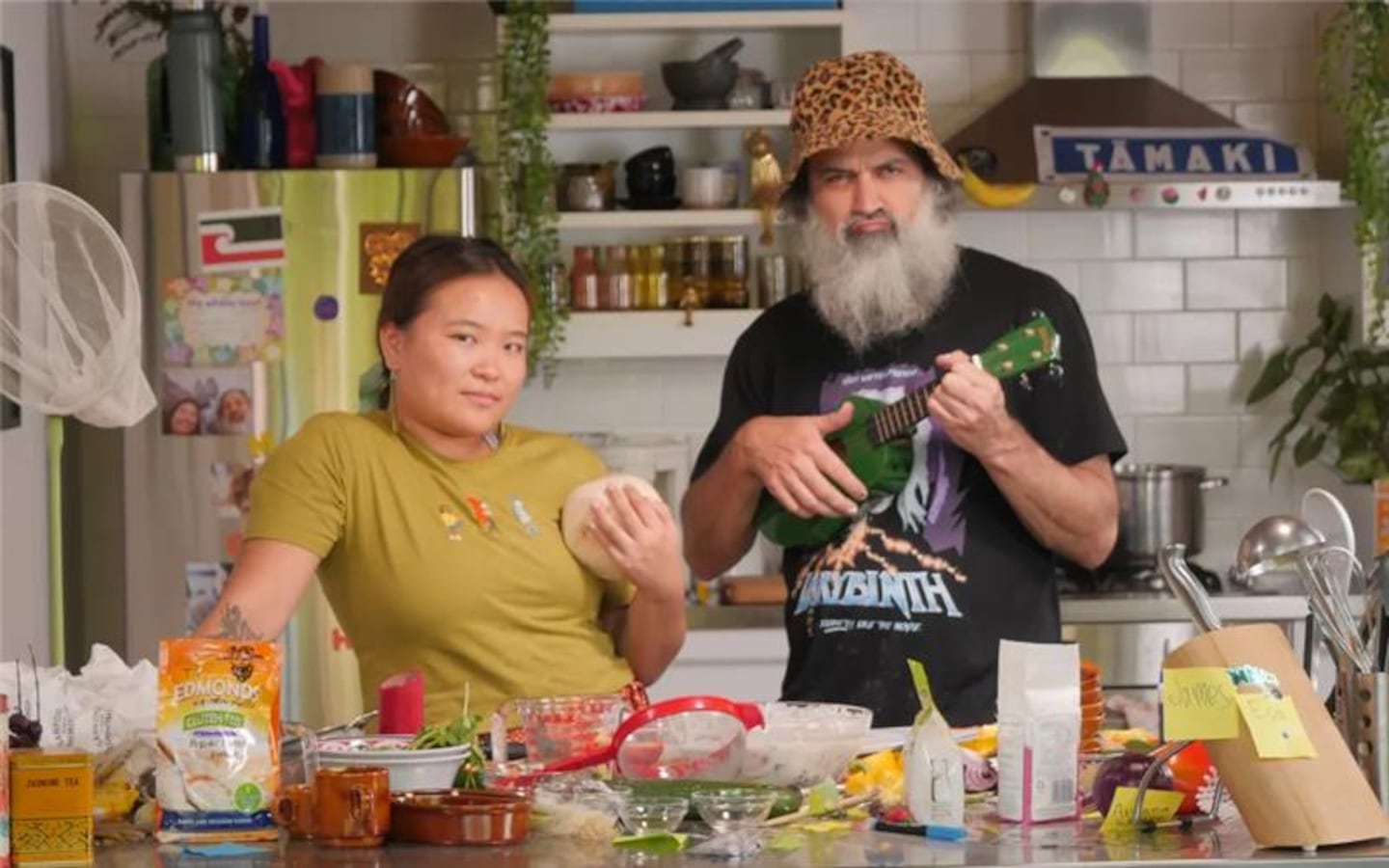This article was first published by RNZ.
A light-hearted pilot cooking show in te reo Māori has been launched recently on Whakaata Māori to encourage people to give the language a go.
Co-hosted by journalist Eda Tang and independent musician James Dansey (Tūwharetoa, Ngāruahine), Āku Hapa is filled with laughter and jokes as the co-hosts cook kai and serve it to a guest.
As te reo learners, the hosts would make mistakes as they spoke the language.
“We’re not here to teach anything, other than to help others feel more at ease with making mistakes,” Tang said.
The name of the show Āku Hapa is a play on words as “hapa” means both “mistakes” and “dinner”, so the phrase can either mean “my mistakes” or “my dinner”, Tang explained.
Born and bred here in New Zealand, Tang said her parents who immigrated from Guangdong in China needed to learn English.
“It’s sad that tauiwi (non-Māori) are still legislatively expected to learn the language that colonised this whenua (land), but not the language that comes from here,” Tang said.
“So that’s one of the reasons where I feel it’s a responsibility for anyone who gets to live in Aotearoa to learn te reo Māori.”
Tang said it was also important to hold space for tangata whenua (Māori people) to regain their language because “it’s not just language acquisition, but it’s a whole lot of other processing that happens”.
Learning te reo also strengthened her connection to her Chinese heritage as the culture encourages people to explore where they come from, Tang said.
“It’s everyone’s responsibility to revitalise a language, not just Māori... it’s not really revitalised until we’re speaking it to one another.”
Dansey, who was Tang’s classmate at their te reo course, said the duo thought there was value in portraying what they saw happening in their rūmaki (immersion) reo class.
“More specifically, how the slow, stilted, hapa-filled sentences, when treated with aroha and whānaungatanga, could lead to genuine moments of connection, warmth and humour.
“We hope anyone who is thinking about learning te reo Māori, or is in the early stages of their haerenga, can watch this and find a sense of fun and kindness.”
Journalist Paula Penfold was the guest for this episode, who was also a classmate to Tang and Dansey.
She said she regretted not putting her own children (Ngāti Kahungunu) through kōhanga reo and she hoped to help them reclaim te reo through learning the language herself.
Penfold said te reo was a living language and a taonga (treasure), and trying to speak it, where mistakes were almost inevitable, was important to its survival.
It was always a relief to hear teachers say “nau mai ngā hapa”, which meant mistakes are welcomed, she said.
“Learning te reo is not a linear journey. There can be times when your confidence propels you forward to speak up loudly, and other times when you feel a complete numpty and a failure,” she said.
“I think Āku Hapa is a beautiful celebration of te reo Māori and I hope there will be a whole series off the back of this pilot."
Director of the show Robert George, who is Māori (Ngāti Kearoa Ngāti Tuara and Ngāti Awa, Cook Island Māori) is also learning te reo, saying he enjoyed making a safe space for learning and making it funny and quirky.
Especially with Māori people who were trying to learn their own language at a later stage of their lives, there can be some shame and embarrassment attached, George said.
“You get real serious really quick. I think because of colonisation, because of trauma, because... that gets passed down to you,” he said.
“Language learning, especially learning is an adult. You want it to be open and accessible to everyone, to be inclusive. I think being silly and fun... helps to make it a safe space.”
The team hoped to make more episodes when funding became available.
By Liu Chen of RNZ.


